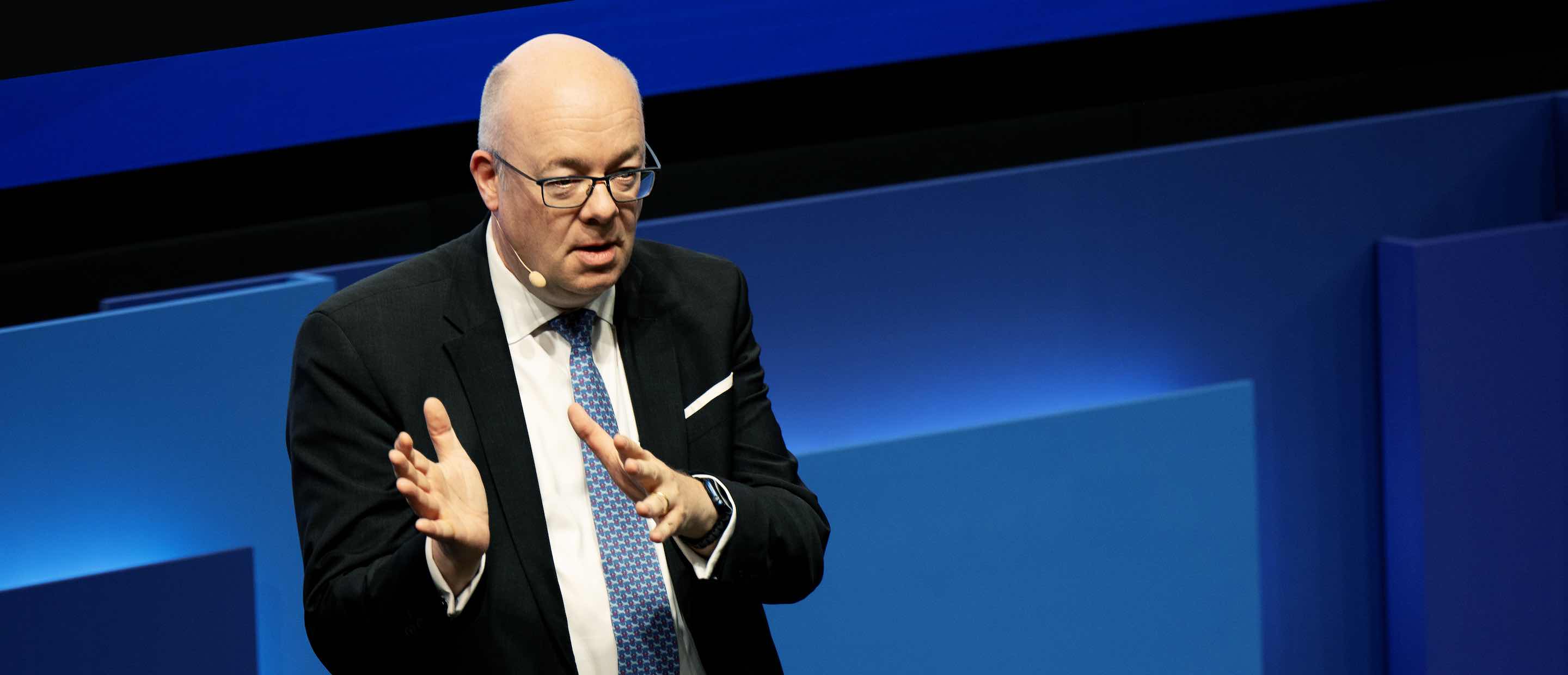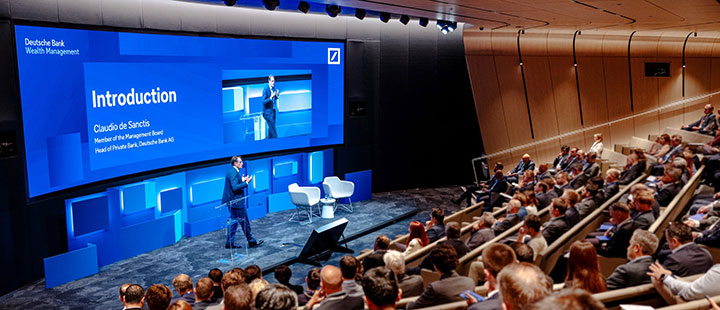057029 072925

Global economic outlook: the key risks and opportunities
Global growth prospects, the impact of US tariffs on inflation and expectations for bonds, equities and gold were on the agenda in this session featuring interactive audience polling.
Christian Nolting, Global Chief Investment Officer at Deutsche Bank Private Bank, addressed the key issues affecting the international macroeconomic environment, and sought the views of family office investors in attendance. Asked to evaluate the global economic situation, more than two thirds of delegates rated it either neutral (38 percent) or weak (30 percent) with 29 percent saying it was acceptable. Nolting said the caution was no surprise. He cited increased fiscal spending, particularly in Germany, as one reason for optimism, but added: “We need to see that this is deployed in the right way.”
The US can avoid recession “as long as we have some solutions in early Q3 on trade”, but the risk will increase if “it takes until Q4”. “We think the US can grow at 1.3 percent this year – which is not brilliant, but it’s not a recession – and next year it’s probably 1.4 percent,” said Nolting. Major events in the US in 2026 include the country’s 250th anniversary, the football World Cup and November’s mid-term elections. President Donald Trump may therefore use fiscal spending to boost the economy if necessary, he suggested. Among attendees, 56 percent did not expect a US recession in the next 12 months, 22 percent did, and the remainder were unsure.
Over the next decade, the audience overwhelmingly viewed Asia as likely to see the highest GDP growth: it won 74 percent of the vote, compared with 18 percent for the US and 8 percent for Europe. “Where did President Xi [Jinping] go first after the tariffs came in?” asked Nolting. “Southeast Asia.” The economies of Southeast Asia could be “winners” both for growth and from an inflation perspective, he suggested.
US inflation risk poses rates dilemma
Inflation in the US is likely to rise to 3 percent during Q3, predicted Nolting. While many companies may have initially absorbed tariff costs by reducing margins, “some pass-through to the consumer” will be inevitable given the level of tariffs on Chinese goods, he said. He expects the Trump Administration to continue using tariffs “as a negotiating tool”, but added that “waking up without China is impossible for the US”.
Asked which risk could have the greatest impact on the global economy, 41 percent of our audience cited US tariffs and countermeasures. Fiscal excesses and debt sustainability ranked second, with 34 percent.
With US growth weakening but inflation a real risk, the Federal Reserve will face a difficult monetary policy dilemma. “I do expect some cuts by the Fed, but don’t expect too many,” said Nolting. Worldwide, deglobalisation poses another inflationary risk as companies look to reorganise their supply chains, he added.
Asset class opportunities in equities and gold
US Treasury bonds are likely to remain volatile due to debate on fiscal spending and term premiums, predicted Nolting. However, he still expects the yield to be around 4.5 percent – similar to now – in a year’s time rather than dipping significantly as some expect. Italy, France, Germany and the UK have performed well in corporate bonds spreads since the US introduced its 10 percent baseline tariff in early April, he added.
Turning to equities, Nolting said: “The good news is the market is not euphoric. It's not saying ‘forget about the tariffs, everything is fine.’” Instead, markets are differentiating between sectors worst-hit by the tariffs and those with better prospects; auto stocks are “really suffering” while European banks are faring well, “reflecting the higher for longer view” of interest rates and low price-to-book ratios.
With fiscal spending helping to stave off the threat of recession, Nolting said equity markets represent “a buying opportunity”. On commodities, he suggested the oil price has a $60 “floor”, and that the outlook for gold remains positive as central banks continue to diversify away from the US dollar.
Key takeaways:
- More than two thirds of delegates rated the current global economic situation either neutral (38 percent) or weak (30 percent), with 29 percent saying it was acceptable.
- The US could grow at 1.3 percent this year and 1.4 percent in 2026, predicted Christian Nolting, Global Chief Investment Officer at Deutsche Bank Private Bank. While 56 percent of attendees did not expect a US recession in the next year, 22 percent did.
- US inflation is likely to rise in Q3 as some “pass-through” to consumers from tariffs becomes inevitable. While the Federal Reserve may cut rates to support growth, inflation risks could limit the number of cuts.
- 74 percent of delegates expect Asia to see the highest GDP growth over the next decade. Southeast Asian economies could be strong performers as they strengthen trade ties with China amid the fallout from US tariffs.
- Gold continues to have a positive outlook as central banks diversify away from the US dollar. The oil price “floor” is likely to be around $60, says Nolting.
- Equity markets are differentiating between sectors based on global events — this has been negative for auto stocks but positive for European banks with low price-to-book ratios.
This event was from the latest in our series of family office conferences held around the world in recent years. You can find out more about previous events, and about the services we offer to family offices, here.
